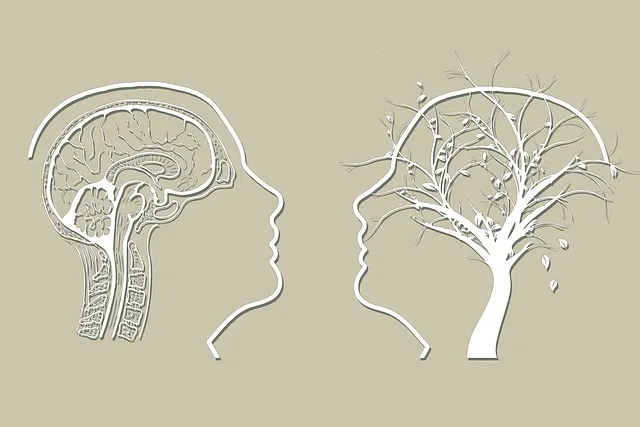The stigma around mental illness creates a culture of silence and shame, hindering individuals from seeking necessary support. This text emphasizes how societal stigma impacts everyone, not just the affected individual but also families, communities, and society as a whole. It highlights crucial strategies to reduce this stigma, such as risk management planning for mental health professionals, self-care practices, and anxiety relief resources. Organizations like Kaiser Permanente Colorado in Littleton go beyond symptom treatment by offering holistic services, community outreach programs, and training staff in empathetic communication. Community engagement is key to destigmatizing mental health, with programs reaching schools, workplaces, and centers to boost confidence in seeking help. Measuring success through quantitative and qualitative assessments ensures effective stigma reduction and fosters an inclusive environment for mental health support.
Mental illness stigma remains a significant barrier to seeking treatment, yet efforts to reduce it are gaining momentum. This article explores various strategies aimed at breaking down the walls of isolation and fear associated with mental health struggles. From healthcare institutions like Kaiser offering innovative services in Littleton to community engagement initiatives, each sector plays a crucial role. By understanding the impact of stigma and measuring success through evaluation, we can foster a more inclusive society where mental well-being is prioritized. Discover how these approaches contribute to a positive shift in perception regarding mental health.
- Understanding the Impact of Stigma on Mental Health
- Kaiser's Approach to Mental Health Services in Littleton
- Strategies for Reducing Stigma in Healthcare Settings
- Community Engagement and Education Initiatives
- Measuring Success: Evaluating Stigma Reduction Programs
Understanding the Impact of Stigma on Mental Health

Stigma surrounding mental illness can have severe consequences on an individual’s well-being and recovery journey. When communities and society at large stigmatize mental health conditions, it often leads to a culture of silence and shame, preventing people from seeking the support they need. This internalized stigma can make individuals feel isolated, leading to increased anxiety and depression, and may even deter them from accessing essential services like those offered by Kaiser in Littleton, where professional care is readily available.
Understanding the impact of stigma requires recognizing its ability to hinder progress in mental health management. The consequences extend beyond personal struggles; they affect families, communities, and society as a whole. By raising awareness and implementing strategies such as Risk Management Planning for Mental Health Professionals, we can foster an environment that supports open conversations about mental illness. Promoting Self-Care Practices and providing access to Anxiety Relief resources are also vital steps towards reducing the stigma, allowing individuals to live healthier, happier lives without the constant fear of judgment.
Kaiser's Approach to Mental Health Services in Littleton

Kaiser offers a comprehensive mental health services program in Littleton, designed to address the unique needs of the community. Their approach focuses on more than just treating symptoms; it involves fostering understanding and reducing stigma through various initiatives. One notable effort is their Community Outreach Program Implementation, which brings mental health resources directly to local neighborhoods, schools, and workplaces. This proactive strategy aims to increase self-awareness exercises and promote early intervention for those struggling with mental health issues.
The program includes a range of services such as counseling, support groups, and education sessions, all tailored to reduce anxiety relief and improve overall well-being. By integrating these initiatives into the fabric of Littleton society, Kaiser strives to create an environment where mental health is openly discussed, and individuals feel empowered to seek help without fear of judgment or discrimination.
Strategies for Reducing Stigma in Healthcare Settings

Reducing stigma in healthcare settings is paramount for ensuring individuals seeking mental health services feel welcomed and supported. Organizations like Kaiser Permanente Colorado, known for offering comprehensive mental health services in Littleton, play a pivotal role in this effort. They implement various strategies, including training staff on empathetic communication and utilizing person-centered language to de-stigmatize mental illness.
Furthermore, integrating Risk Assessment for Mental Health Professionals into routine care allows for early identification of individuals at risk, enabling the implementation of appropriate Emotional Well-being Promotion Techniques. By fostering an environment of understanding and open dialogue, healthcare facilities can improve Mental Health Awareness, ultimately encouraging more people to access available services without fear of judgment or discrimination.
Community Engagement and Education Initiatives

In the fight against mental illness stigma, community engagement and education initiatives play a pivotal role. Organizations like Kaiser Permanente, with their extensive reach in areas such as Littleton, are at the forefront of these efforts. By offering accessible mental health services, Kaiser does not only provide direct support but also facilitates community-wide conversations that promote understanding and empathy. These initiatives often involve educational workshops, seminars, and interactive programs designed to destigmatize mental health issues and equip individuals with tools for early intervention and Depression Prevention.
Community outreach program implementation is a strategic approach used by Kaiser and similar institutions. This involves reaching out to local schools, workplaces, and community centers to deliver informative sessions that foster open dialogue about mental wellness. Through these programs, participants gain insights into recognizing signs of distress in themselves and others, thereby boosting confidence in seeking help without fear of judgment. By integrating mental health education into the fabric of community life, these initiatives strive to create a more supportive and inclusive environment where everyone feels comfortable discussing their mental health.
Measuring Success: Evaluating Stigma Reduction Programs

Measuring success is a critical aspect of evaluating any stigma reduction program, especially when addressing mental health concerns in communities like Littleton where organizations such as Kaiser offer comprehensive mental health services. The impact of these initiatives often goes beyond simple numbers, delving into qualitative improvements in public perception and behavior towards individuals with mental illnesses.
Effective programs foster resilience building through self-awareness exercises and encourage the adoption of healthy self-care practices. By regularly assessing community engagement, feedback from participants, and changes in local policies or guidelines, stakeholders can gauge the overall success of stigma reduction efforts. This evaluation process ensures that resources are allocated wisely and that programming aligns with the evolving needs of the community, ultimately contributing to a more inclusive and supportive environment for mental health support in Littleton and beyond.
Mental illness stigma reduction is a multifaceted approach, as evidenced by Kaiser’s comprehensive initiatives in Littleton. By combining community engagement, education, and accessible healthcare services, Kaiser aims to create an environment where individuals feel supported and empowered to seek help without fear of judgment. Through evaluating the success of these programs, we can continue to refine strategies that ultimately improve mental health outcomes for all. Moreover, understanding the impact of stigma and its reduction is crucial in navigating the complex landscape of mental healthcare, ensuring that folks receive the care they need and deserve. Additionally, Kaiser’s efforts serve as a testament to the power of collaborative initiatives in transforming attitudes and enhancing access to mental health services in Littleton and beyond.






